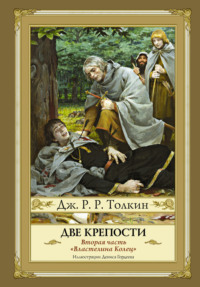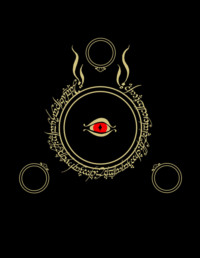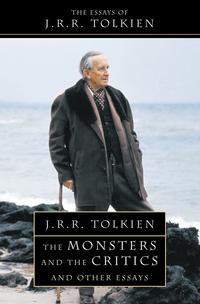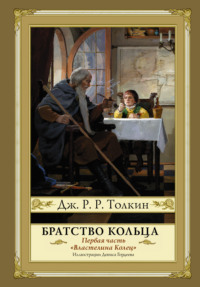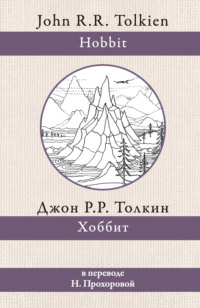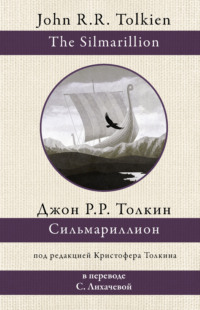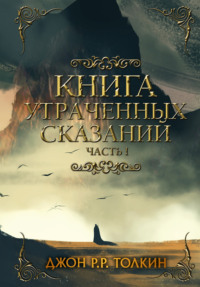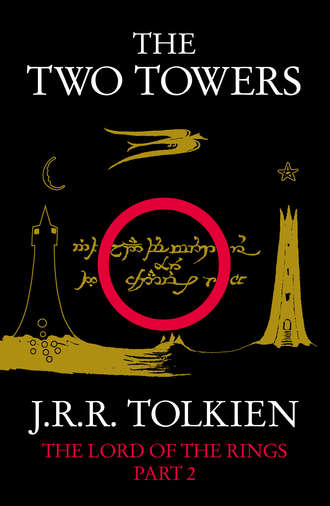
Полная версия
The Two Towers



THE TWO TOWERS
BEING THE SECOND PART OF
THE LORD OF THE RINGS
BY
J.R.R. TOLKIEN


COPYRIGHT
HarperCollins Publishers Ltd. 1 London Bridge Street London SE1 9GF
www.harpercollins.co.uk
Published by HarperCollinsPublishers 2008
This edition is based on the reset edition first published 2004
First published in Great Britain by George Allen & Unwin 1954
Second Edition 1966
Copyright © The Trustees of the J.R.R.Tolkien 1967 Settlement 1954, 1966

www.tolkien.co.uk
www.tolkienestate.com
J.R.R. Tolkien asserts the moral right to be identified as the author of this work
A catalogue record for this book is available from the British Library
All rights reserved under International and Pan-American Copyright Conventions. By payment of the required fees, you have been granted the non-exclusive, non-transferable right to access and read the text of this ebook on-screen. No part of this text may be reproduced, transmitted, down-loaded, decompiled, reverse engineered, or stored in or introduced into any information storage and retrieval system, in any form or by any means, whether electronic or mechanical, now known or hereinafter invented, without the express written permission of HarperCollins ebooks
HarperCollinsPublishers has made every reasonable effort to ensure that any picture content and written content in this ebook has been included or removed in accordance with the contractual and technological constraints in operation at the time of publication
Source ISBN: 9780261103580
Ebook Edition © APRIL 2009 ISBN: 9780007322503
Version: 2016-10-14
The Two Towers is the second part of J.R.R. Tolkien’s epic adventure The Lord of the Rings, a beautifully written masterpiece which is among the greatest works of imaginative fiction of the twentieth century. ‘For width of imagination’ said the novelist Richard Hughes, ‘it almost beggars parallel, and it is nearly as remarkable for its vividness and narrative skill which carries the reader on enthralled for page after page.’
C.S. Lewis wrote: ‘No imaginary world has been projected which is at once multifarious and so true to its own inner laws; none so seemingly objective, so disinfected from the taint of an author’s merely individual psychology; none so relevant to the actual human situation yet free from allegory. And what fine shading there is in the variations of style to meet the almost endless diversity of scenes and characters – comic, homely, epic, monstrous, or diabolic.’
‘It is timeless,’ said Naomi Mitchison, ‘and will go on and on.’
This is the second part of a three-book paperback edition which reproduces the complete authoritative text of The Lord of the Rings, together with the original maps drawn by Christopher Tolkien. The Appendices and a fully revised and expanded Index are included in The Return of the King.
Three Rings for the Elven-kings under the sky,
Seven for the Dwarf-lords in their halls of stone,
Nine for Mortal Men doomed to die,
One for the Dark Lord on his dark throne
In the Land of Mordor where the Shadows lie.
One Ring to rule them all, One Ring to find them,
One Ring to bring them all and in the darkness bind them
In the Land of Mordor where the Shadows lie.
SYNOPSIS
This is the second part of The Lord of the Rings.
The first part, The Fellowship of the Ring, told how Gandalf the Grey discovered that the ring possessed by Frodo the Hobbit was in fact the One Ring, ruler of all the Rings of Power. It recounted the flight of Frodo and his companions from the quiet Shire of their home, pursued by the terror of the Black Riders of Mordor, until at last, with the aid of Aragorn the Ranger of Eriador, they came through desperate perils to the house of Elrond in Rivendell.
There was held the great Council of Elrond, at which it was decided to attempt the destruction of the Ring, and Frodo was appointed the Ring-bearer. The Companions of the Ring were then chosen, who were to aid him in his quest: to come if he could to the Mountain of Fire in Mordor, the land of the Enemy himself, where alone the Ring could be unmade. In this fellowship were Aragorn and Boromir son of the Lord of Gondor, representing Men; Legolas son of the Elven-king of Mirkwood, for the Elves; Gimli son of Glóin of the Lonely Mountain, for the Dwarves; Frodo with his servant Samwise, and his two young kinsmen Meriadoc and Peregrin, for the Hobbits; and Gandalf the Grey.
The Companions journeyed in secret far from Rivendell in the North, until baffled in their attempt to cross the high pass of Caradhras in winter, they were led by Gandalf through the hidden gate and entered the vast Mines of Moria, seeking a way beneath the mountains. There Gandalf, in battle with a dreadful spirit of the underworld, fell into a dark abyss. But Aragorn, now revealed as the hidden heir of the ancient Kings of the West, led the Company on from the East Gate of Moria, through the Elvish land of Lórien, and down the great River Anduin, until they came to the Falls of Rauros. Already they had become aware that their journey was watched by spies, and that the creature Gollum, who once had possessed the Ring and still lusted for it, was following their trail.
It now became necessary for them to decide whether they should turn east to Mordor; or go on with Boromir to the aid of Minas Tirith, chief city of Gondor, in the coming war; or should divide. When it became clear that the Ring-bearer was resolved to continue his hopeless journey to the land of the Enemy, Boromir attempted to seize the Ring by force. The first part ended with the fall of Boromir to the lure of the Ring; with the escape and disappearance of Frodo and his servant Samwise; and the scattering of the remainder of the Fellowship by a sudden attack of orc-soldiers, some in the service of the Dark Lord of Mordor, some of the traitor Saruman of Isengard. The Quest of the Ring-bearer seemed already overtaken by disaster.
This second part, The Two Towers, now tells how each of the members of the Fellowship of the Ring fared, after the breaking of their fellowship, until the coming of the great Darkness and the outbreak of the War of the Ring, which is to be recounted in the third and last part.
Contents
COVER PAGE
TITLE PAGE
COPYRIGHT
SYNOPSIS
BOOK THREE
CHAPTER 1: THE DEPARTURE OF BOROMIR
CHAPTER 2: THE RIDERS OF ROHAN
CHAPTER 3: THE URUK-HAI
CHAPTER 4: TREEBEARD
CHAPTER 5: THE WHITE RIDER
CHAPTER 6: THE KING OF THE GOLDEN HALL
CHAPTER 7: HELM’S DEEP
CHAPTER 8: THE ROAD TO ISENGARD
CHAPTER 9: FLOTSAM AND JETSAM
CHAPTER 10: THE VOICE OF SARUMAN
CHAPTER 11: THE PALANTÍR
BOOK FOUR
CHAPTER 1: THE TAMING OF SMÉAGOL
CHAPTER 2: THE PASSAGE OF THE MARSHES
CHAPTER 3: THE BLACK GATE IS CLOSED
CHAPTER 4: OF HERBS AND STEWED RABBIT
CHAPTER 5: THE WINDOW ON THE WEST
CHAPTER 6: THE FORBIDDEN POOL
CHAPTER 7: JOURNEY TO THE CROSS-ROADS
CHAPTER 8: THE STAIRS OF CIRITH UNGOL
CHAPTER 9: SHELOB’S LAIR
CHAPTER 10: THE CHOICES OF MASTER SAMWISE
MAPS
KEEP READING
WORKS BY J.R.R. TOLKIEN
ABOUT THE PUBLISHER
BOOK THREE
Chapter 1
THE DEPARTURE OF BOROMIR
Aragorn sped on up the hill. Every now and again he bent to the ground. Hobbits go light, and their footprints are not easy even for a Ranger to read, but not far from the top a spring crossed the path, and in the wet earth he saw what he was seeking.
‘I read the signs aright,’ he said to himself. ‘Frodo ran to the hill-top. I wonder what he saw there? But he returned by the same way, and went down the hill again.’
Aragorn hesitated. He desired to go to the high seat himself, hoping to see there something that would guide him in his perplexities; but time was pressing. Suddenly he leaped forward, and ran to the summit, across the great flag-stones, and up the steps. Then sitting in the high seat he looked out. But the sun seemed darkened, and the world dim and remote. He turned from the North back again to North, and saw nothing save the distant hills, unless it were that far away he could see again a great bird like an eagle high in the air, descending slowly in wide circles down towards the earth.
Even as he gazed his quick ears caught sounds in the woodlands below, on the west side of the River. He stiffened. There were cries, and among them, to his horror, he could distinguish the harsh voices of Orcs. Then suddenly with a deep-throated call a great horn blew, and the blasts of it smote the hills and echoed in the hollows, rising in a mighty shout above the roaring of the falls.
‘The horn of Boromir!’ he cried. ‘He is in need!’ He sprang down the steps and away, leaping down the path. ‘Alas! An ill fate is on me this day, and all that I do goes amiss. Where is Sam?’
As he ran the cries came louder, but fainter now and desperately the horn was blowing. Fierce and shrill rose the yells of the Orcs, and suddenly the horn-calls ceased. Aragorn raced down the last slope, but before he could reach the hill’s foot, the sounds died away; and as he turned to the left and ran towards them they retreated, until at last he could hear them no more. Drawing his bright sword and crying Elendil! Elendil! he crashed through the trees.
A mile, maybe, from Parth Galen in a little glade not far from the lake he found Boromir. He was sitting with his back to a great tree, as if he was resting. But Aragorn saw that he was pierced with many black-feathered arrows; his sword was still in his hand, but it was broken near the hilt; his horn cloven in two was at his side. Many Orcs lay slain, piled all about him and at his feet.
Aragorn knelt beside him. Boromir opened his eyes and strove to speak. At last slow words came. ‘I tried to take the Ring from Frodo,’ he said. ‘I am sorry. I have paid.’ His glance strayed to his fallen enemies; twenty at least lay there. ‘They have gone: the Halflings: the Orcs have taken them. I think they are not dead. Orcs bound them.’ He paused and his eyes closed wearily. After a moment he spoke again.
‘Farewell, Aragorn! Go to Minas Tirith and save my people! I have failed.’
‘No!’ said Aragorn, taking his hand and kissing his brow. ‘You have conquered. Few have gained such a victory. Be at peace! Minas Tirith shall not fall!’
Boromir smiled.
‘Which way did they go? Was Frodo there?’ said Aragorn.
But Boromir did not speak again.
‘Alas!’ said Aragorn. ‘Thus passes the heir of Denethor, Lord of the Tower of Guard! This is a bitter end. Now the Company is all in ruin. It is I that have failed. Vain was Gandalf’s trust in me. What shall I do now? Boromir has laid it on me to go to Minas Tirith, and my heart desires it; but where are the Ring and the Bearer? How shall I find them and save the Quest from disaster?’
He knelt for a while, bent with weeping, still clasping Boromir’s hand. So it was that Legolas and Gimli found him. They came from the western slopes of the hill, silently, creeping through the trees as if they were hunting. Gimli had his axe in hand, and Legolas his long knife: all his arrows were spent. When they came into the glade they halted in amazement; and then they stood a moment with heads bowed in grief, for it seemed to them plain what had happened.
‘Alas!’ said Legolas, coming to Aragorn’s side. ‘We have hunted and slain many Orcs in the woods, but we should have been of more use here. We came when we heard the horn – but too late, it seems. I fear you have taken deadly hurt.’
‘Boromir is dead,’ said Aragorn. ‘I am unscathed, for I was not here with him. He fell defending the hobbits, while I was away upon the hill.’
‘The hobbits!’ cried Gimli. ‘Where are they then? Where is Frodo?’
‘I do not know,’ answered Aragorn wearily. ‘Before he died Boromir told me that the Orcs had bound them; he did not think that they were dead. I sent him to follow Merry and Pippin; but I did not ask him if Frodo or Sam were with him: not until it was too late. All that I have done today has gone amiss. What is to be done now?’
‘First we must tend the fallen,’ said Legolas. ‘We cannot leave him lying like carrion among these foul Orcs.’
‘But we must be swift,’ said Gimli. ‘He would not wish us to linger. We must follow the Orcs, if there is hope that any of our Company are living prisoners.’
‘But we do not know whether the Ring-bearer is with them or not,’ said Aragorn. ‘Are we to abandon him? Must we not seek him first? An evil choice is now before us!’
‘Then let us do first what we must do,’ said Legolas. ‘We have not the time or the tools to bury our comrade fitly, or to raise a mound over him. A cairn we might build.’
‘The labour would be hard and long: there are no stones that we could use nearer than the water-side,’ said Gimli.
‘Then let us lay him in a boat with his weapons, and the weapons of his vanquished foes,’ said Aragorn. ‘We will send him to the Falls of Rauros and give him to Anduin. The River of Gondor will take care at least that no evil creature dishonours his bones.’
Quickly they searched the bodies of the Orcs, gathering their swords and cloven helms and shields into a heap.
‘See!’ cried Aragorn. ‘Here we find tokens!’ He picked out from the pile of grim weapons two knives, leaf-bladed, damasked in gold and red; and searching further he found also the sheaths, black, set with small red gems. ‘No orc-tools these!’ he said. ‘They were borne by the hobbits. Doubtless the Orcs despoiled them, but feared to keep the knives, knowing them for what they are: work of Westernesse, wound about with spells for the bane of Mordor. Well, now, if they still live, our friends are weaponless. I will take these things, hoping against hope, to give them back.’
‘And I,’ said Legolas, ‘will take all the arrows that I can find, for my quiver is empty.’ He searched in the pile and on the ground about and found not a few that were undamaged and longer in the shaft than such arrows as the Orcs were accustomed to use. He looked at them closely.
And Aragorn looked on the slain, and he said: ‘Here lie many that are not folk of Mordor. Some are from the North, from the Misty Mountains, if I know anything of Orcs and their kinds. And here are others strange to me. Their gear is not after the manner of Orcs at all!’
There were four goblin-soldiers of greater stature, swart, slant-eyed, with thick legs and large hands. They were armed with short broad-bladed swords, not with the curved scimitars usual with Orcs; and they had bows of yew, in length and shape like the bows of Men. Upon their shields they bore a strange device: a small white hand in the centre of a black field; on the front of their iron helms was set an S-rune, wrought of some white metal.
‘I have not seen these tokens before,’ said Aragorn. ‘What do they mean?’
‘S is for Sauron,’ said Gimli. ‘That is easy to read.’
‘Nay!’ said Legolas. ‘Sauron does not use the elf-runes.’
‘Neither does he use his right name, nor permit it to be spelt or spoken,’ said Aragorn. ‘And he does not use white. The Orcs in the service of Barad-dûr use the sign of the Red Eye.’ He stood for a moment in thought. ‘S is for Saruman, I guess,’ he said at length. ‘There is evil afoot in Isengard, and the West is no longer safe. It is as Gandalf feared: by some means the traitor Saruman has had news of our journey. It is likely too that he knows of Gandalf’s fall. Pursuers from Moria may have escaped the vigilance of Lórien, or they may have avoided that land and come to Isengard by other paths. Orcs travel fast. But Saruman has many ways of learning news. Do you remember the birds?’
‘Well, we have no time to ponder riddles,’ said Gimli. ‘Let us bear Boromir away!’
‘But after that we must guess the riddles, if we are to choose our course rightly,’ answered Aragorn.
‘Maybe there is no right choice,’ said Gimli.
Taking his axe the Dwarf now cut several branches. These they lashed together with bowstrings, and spread their cloaks upon the frame. Upon this rough bier they carried the body of their companion to the shore, together with such trophies of his last battle as they chose to send forth with him. It was only a short way, yet they found it no easy task, for Boromir was a man both tall and strong.
At the water-side Aragorn remained, watching the bier, while Legolas and Gimli hastened back on foot to Parth Galen. It was a mile or more, and it was some time before they came back, paddling two boats swiftly along the shore.
‘There is a strange tale to tell!’ said Legolas. ‘There are only two boats upon the bank. We could find no trace of the other.’
‘Have Orcs been there?’ asked Aragorn.
‘We saw no signs of them,’ answered Gimli. ‘And Orcs would have taken or destroyed all the boats, and the baggage as well.’
‘I will look at the ground when we come there,’ said Aragorn.
Now they laid Boromir in the middle of the boat that was to bear him away. The grey hood and elven-cloak they folded and placed beneath his head. They combed his long dark hair and arrayed it upon his shoulders. The golden belt of Lórien gleamed about his waist. His helm they set beside him, and across his lap they laid the cloven horn and the hilt and shards of his sword; beneath his feet they put the swords of his enemies. Then fastening the prow to the stern of the other boat, they drew him out into the water. They rowed sadly along the shore, and turning into the swift-running channel they passed the green sward of Parth Galen. The steep sides of Tol Brandir were glowing: it was now mid-afternoon. As they went south the fume of Rauros rose and shimmered before them, a haze of gold. The rush and thunder of the falls shook the windless air.
Sorrowfully they cast loose the funeral boat: there Boromir lay, restful, peaceful, gliding upon the bosom of the flowing water. The stream took him while they held their own boat back with their paddles. He floated by them, and slowly his boat departed, waning to a dark spot against the golden light; and then suddenly it vanished. Rauros roared on unchanging. The River had taken Boromir son of Denethor, and he was not seen again in Minas Tirith, standing as he used to stand upon the White Tower in the morning. But in Gondor in after-days it long was said that the elven-boat rode the falls and the foaming pool, and bore him down through Osgiliath, and past the many mouths of Anduin, out into the Great Sea at night under the stars.
For a while the three companions remained silent, gazing after him. Then Aragorn spoke. ‘They will look for him from the White Tower,’ he said, ‘but he will not return from mountain or from sea.’ Then slowly he began to sing:
Through Rohan over fen and field where the long grass grows
The West Wind comes walking, and about the walls it goes.
‘What news from the West, O wandering wind, do you bring to me tonight?
Have you seen Boromir the Tall by moon or by starlight?’
‘I saw him ride over seven streams, over waters wide and grey;
I saw him walk in empty lands, until he passed away
Into the shadows of the North. I saw him then no more.
The North Wind may have heard the horn of the son of Denethor.’
‘O Boromir! From the high walls westward I looked afar,
But you came not from the empty lands where no men are.’
Then Legolas sang:
From the mouths of the Sea the South Wind flies, from the sandhills and the stones;
The wailing of the gulls it bears, and at the gate it moans.
‘What news from the South, O sighing wind, do you bring to me at eve?
Where now is Boromir the Fair? He tarries and I grieve.’
‘Ask not of me where he doth dwell – so many bones there lie
On the white shores and the dark shores under the stormy sky;
So many have passed down Anduin to find the flowing Sea.
Ask of the North Wind news of them the North Wind sends to me!’
‘O Boromir! Beyond the gate the seaward road runs south,
But you came not with the wailing gulls from the grey sea’s mouth.’
Then Aragorn sang again:
From the Gate of Kings the North Wind rides, and past the roaring falls;
And clear and cold about the tower its loud horn calls.
‘What news from the North, O mighty wind, do you bring to me today?
What news of Boromir the Bold? For he is long away.’
‘Beneath Amon Hen I heard his cry. There many foes he fought.
His cloven shield, his broken sword, they to the water brought.
His head so proud, his face so fair, his limbs they laid to rest;
And Rauros, golden Rauros-falls, bore him upon its breast.’
‘O Boromir! The Tower of Guard shall ever northward gaze
To Rauros, golden Rauros-falls, until the end of days.’
So they ended. Then they turned their boat and drove it with all the speed they could against the stream back to Parth Galen.
‘You left the East Wind to me,’ said Gimli, ‘but I will say naught of it.’
‘That is as it should be,’ said Aragorn. ‘In Minas Tirith they endure the East Wind, but they do not ask it for tidings. But now Boromir has taken his road, and we must make haste to choose our own.’
He surveyed the green lawn, quickly but thoroughly, stooping often to the earth. ‘No Orcs have been on this ground,’ he said. ‘Otherwise nothing can be made out for certain. All our footprints are here, crossing and re-crossing. I cannot tell whether any of the hobbits have come back since the search for Frodo began.’ He returned to the bank, close to where the rill from the spring trickled out into the River. ‘There are some clear prints here,’ he said. ‘A hobbit waded out into the water and back; but I cannot say how long ago.’


